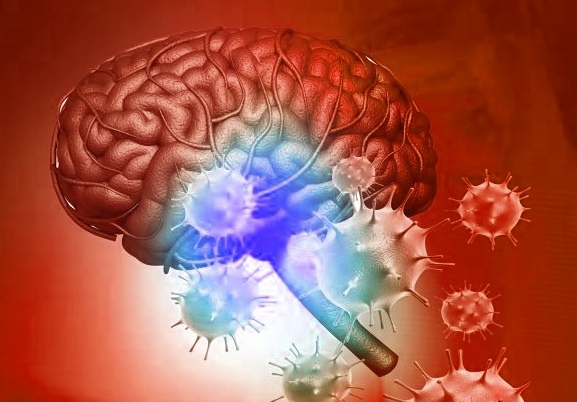SARS-CoV-2 Neurotropism Validated by Surging Levels of Inflammatory Brain Biomarkers in CSF and Plasma
Nikhil Prasad Fact checked by:Thailand Medical News Team Apr 05, 2025 3 weeks, 2 days, 1 hour, 46 minutes ago
Medical News: A groundbreaking study by researchers from Peking Union Medical College Hospital in China has now provided compelling genetic and biological evidence that the SARS-CoV-2 virus - the culprit behind the COVID-19 pandemic - is capable of invading the human nervous system, triggering serious neurological complications. This rare and comprehensive investigation combined a Mendelian Randomization (MR) genetic approach with real-world protein analysis of cerebrospinal fluid (CSF) and plasma samples from infected individuals.
 SARS-CoV-2 Neurotropism Validated by Surging Levels of Inflammatory Brain Biomarkers in CSF and Plasma
SARS-CoV-2 Neurotropism Validated by Surging Levels of Inflammatory Brain Biomarkers in CSF and Plasma
According to the research team led by Dr. Ziyan Wu, Dr. Honglin Xu, and others from Peking Union Medical College Hospital, neurological symptoms have been reported in approximately 30 percent of all COVID-19 cases. These symptoms range from headaches and seizures to strokes, encephalitis, and even psychiatric manifestations. However, until now, definitive scientific proof of the virus’s neurotropic behavior had remained elusive. Through this
Medical News report, the new study sheds light on the molecular footprints left behind by the virus in the brain and spinal fluid, making a significant breakthrough in our understanding of how SARS-CoV-2 attacks the central nervous system.
Genetic Clues and Biological Validation
The study relied heavily on Mendelian Randomization, a technique that uses genetic data from large populations to determine causal relationships between diseases and biological traits. Using genetic data from over 33,000 individuals of European ancestry and proteomic data from Icelandic and Chinese populations, the researchers examined associations between COVID-19 severity and specific brain structural changes, as well as protein biomarkers in CSF and plasma.
The team discovered that patients hospitalized for COVID-19 showed significantly increased brain volume in areas such as the left caudal middle frontal gyrus and the right anterior cingulate cortex - regions associated with emotion and cognition. Moreover, COVID-19 severity was linked to measurable volume increases in the right cuneus cortex, a part of the brain involved in visual processing.
On the biochemical side, levels of several critical proteins were found to be abnormally elevated in the CSF of COVID-19 patients with neurological complications. These included CHI3L1 (also known as YKL-40), NGF-β (nerve growth factor beta), KLK6 (kallikrein 6), and GFAP (glial fibrillary acidic protein). Plasma levels of neurogranin (NRGN), a brain-specific protein involved in synaptic plasticity, were also significantly elevated.
Inflammatory Biomarkers Expose Neurotropic Nature
Among all biomarkers, CHI3L1 stood out as a key indicator of neuroinflammation. CSF levels of CHI3L1 in COVID-19 patients were dramatically higher than in disease controls (13,677 pg/mL vs. 8,421 pg/mL). CHI3L1 is known to be involved in inflammatory and tissue remodeling processes within the brain and may even boost ACE2 expression - the re
ceptor that SARS-CoV-2 uses to enter cells.
NGF-β, another protein that promotes inflammation through immune system activation, was also found at significantly higher levels in COVID-19 CSF samples. KLK6, an enzyme heavily present in the brain and spinal cord, and GFAP, which reflects damage to glial cells, were notably elevated in patients with severe disease or those suffering from reduced consciousness.
The study also reported decreased levels of amyloid beta 1-42 in COVID-19 CSF samples. This protein is typically associated with Alzheimer’s disease, and its drop in levels could suggest an increased risk of long-term neurodegeneration post-infection. Similarly, higher levels of S100B and neurofilament heavy chains (NF-H) were observed, particularly in patients with cognitive impairment or comorbidities.
Subgroup Findings and Implications
A detailed subgroup analysis found that COVID-19 patients in moderate to critical condition had higher levels of GFAP and S100B in their CSF than those with milder forms of the disease. Notably, patients exhibiting symptoms like confusion or seizures had elevated NF-H levels - a protein released during neuronal injury.
Moreover, patients with comorbidities such as hypertension or diabetes were more likely to show raised levels of phosphorylated tau protein (pT181), often linked to Alzheimer’s progression. These changes collectively suggested that SARS-CoV-2 may set off a cascade of neuroinflammatory processes, potentially leading to long-term neurological consequences even after recovery from the acute infection.
A Call for Caution and Further Investigation
The research team acknowledged limitations, such as the use of European genetic data in MR analysis and a relatively small patient cohort from China for biological validation. Still, their dual-approach methodology - using both genetic and biochemical evidence - adds critical weight to the growing consensus that SARS-CoV-2 is neurotropic.
These findings are deeply concerning as they suggest that the virus does not merely affect the lungs but can also penetrate the central nervous system, possibly through cytokine storms, blood-brain barrier disruption, or direct neural invasion. Once inside, it seems capable of triggering sustained inflammation, protein misfolding, and neurodegeneration.
Conclusion
In summary, this robust study confirms that SARS-CoV-2 exhibits Neurotropism, meaning it can actively invade the human nervous system. The use of both genetic tools and actual clinical samples makes this study a landmark in COVID-19 neurological research. The elevated levels of specific inflammatory and neurodegenerative biomarkers in cerebrospinal fluid and plasma provide compelling evidence that neurological damage in COVID-19 patients is real, measurable, and potentially long-lasting. This research raises urgent questions about the long-term mental and neurological health of millions affected by the virus worldwide. The need for regular neurological screening and supportive care for COVID-19 survivors has never been clearer.
The study findings were published on a preprint server and are currently being peer reviewed.
https://www.researchsquare.com/article/rs-5574959/v1
For the latest COVID-19 News, keep on logging to Thailand
Medical News.
Read Also:
https://www.thailandmedical.news/news/study-reveals-alarming-connection-between-disruption-of-brain-waste-clearance-and-long-covid-symptoms
https://www.thailandmedical.news/news/brain-blood-flow-abnormalities-found-in-older-adults-with-long-covid
https://www.thailandmedical.news/news/herpes-virus-in-the-nose-can-lead-to-long-term-brain-and-behavior-issues
https://www.thailandmedical.news/articles/coronavirus
https://www.thailandmedical.news/pages/thailand_doctors_listings
